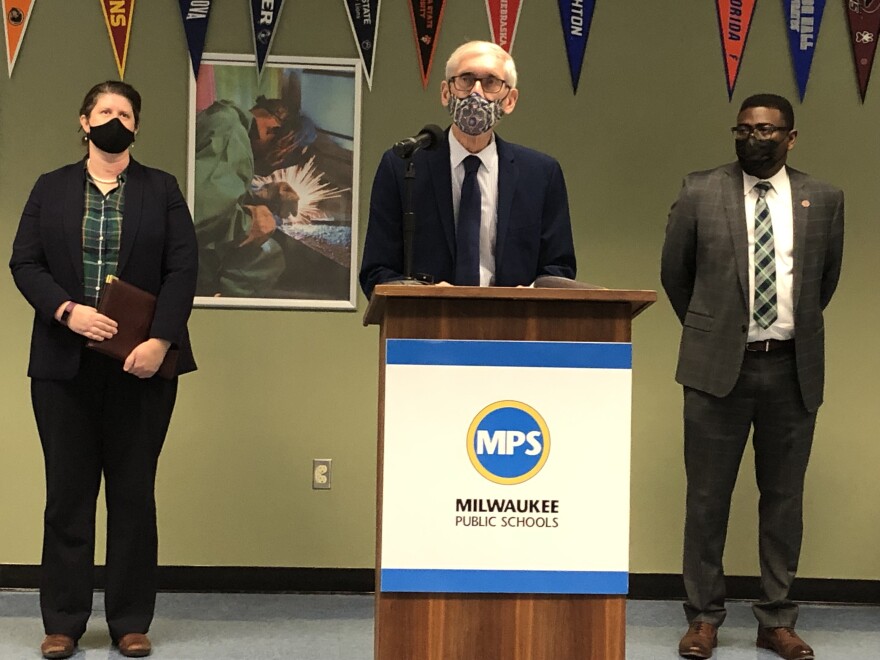It has been another tumultuous year for Wisconsin schools, due to the COVID-19 pandemic and political fights. Here's a recap of some of the top education stories of 2021.
Teachers get vaccinated and students return to classrooms
The beginning of 2021 marked the second half of students’ first full school year during the pandemic. But it also marked the start of COVID-19 vaccination rollout – including to school staff.
"There’s some relief," said Marquette University instructor Andrew Sen. "But at the same time, I think we need to be really careful and maintain all the appropriate safety measures until everyone is vaccinated."
As teachers got vaccinated, many K-12 districts that were virtual brought students back in-person, including Milwaukee Public Schools. Milwaukee German Immersion parent, Sophia Turner, had mixed emotions as she dropped off her first-grader in April.

"It’s just kind of a like a bittersweet day for both of us," Tuner said. "But I’m excited he’s going back. They definitely need to come back. I know they’ll be so much more fluent than what they are at home."
Political fights over funding and teaching
Just as many students were returning to their desks, state politicians were arguing about funding.
Republican lawmakers voted to keep school funding mostly flat in the biennial state budget, over objections from Democrats. Republicans said the state should limit education spending because Wisconsin schools are getting $2.6 billion in federal pandemic aid.
"Look, we cannot step back and dismiss this monstrous amount of money," said Rep. Shannon Zimmerman (R-River Falls).
Having districts rely on one-time money sets up a funding cliff. Democratic Gov. Tony Evers disagreed with it, but he ultimately signed the Republican-crafted budget and used his power to direct more one-time federal funding to schools.

"Just as I said when I signed it, the last budget wasn't good enough for kids," Evers said. "Especially in light of the ongoing panic — a pandemic — and the supports that we know our kids need now more than ever."
There were also political disagreements about what should be taught in Wisconsin classrooms.
Republican legislators introduced one bill that would allow parents to opt out of lessons related to sexual orientation and gender identity, and another that would limit how racism is taught.
The backlash to anti-racism and equity efforts, dubbed by some as "critical race theory," also prompted a recall election at the Mequon-Thiensville school board, which mirrored national efforts by conservative parents and their supporters.
"We want children to reach for the stars, we don’t want to put on a cap on their learning," said organizer and parent Amber Schroeder. "We don’t want to take the kids at the top and bring them to the middle so that we can close the gap. And that’s what they’re attempting to do with the implementation of equity in the district."
The recall failed, but the heightened scrutiny on school boards continues.
New, mostly in-person school year begins
Now we’re in the middle of a new school year. With vaccinations widely available for adults and older children, districts that were virtual for much of last year opened in-person this fall.
MPS high schoolers were able to return to in-person experiences like field trips. Riverside High School student Avery Turner participated in a dance masterclass at the Marcus Center in October.
"The last year and a half for me was kind of dreadful because it was the same thing day in and day out – being in my room, hardly going anywhere because people are afraid of COVID and this and that," Turner said. "But yeah, it feels good to actually see people and hear people so I can actually remember them, rather than seeing a blank screen and hear a ding on the chat."

A couple months into this school year, children ages 5-11 started getting vaccinated, providing more hope for families.
That hope may be waning now as the new omicron variant spreads.
Wisconsin State Superintendent Jill Underly sent an email to school leaders this week urging them to use “layered mitigation strategies” including masking and quarantine, when students return after the holidays.
Have a question about education you'd like WUWM's Emily Files to dig into? Submit it below.
_






